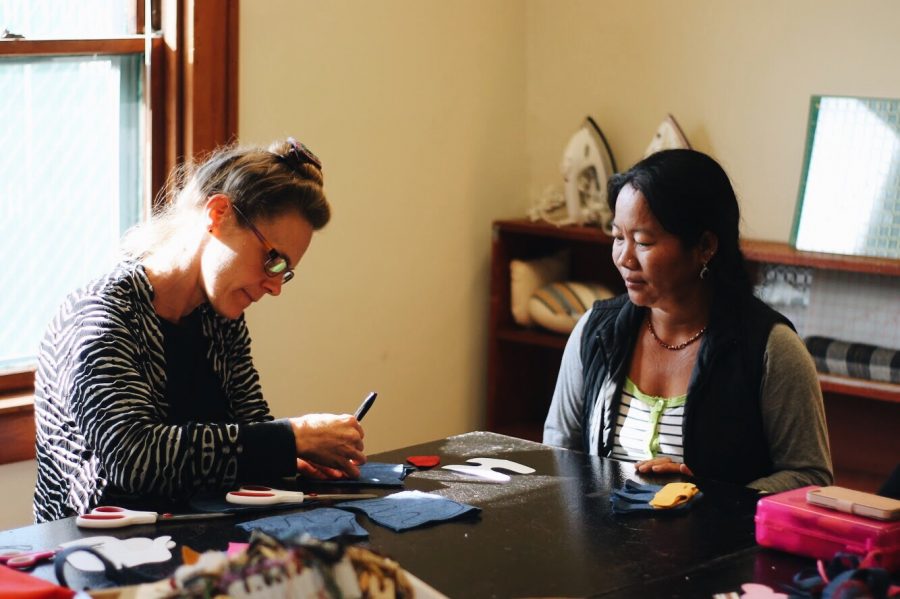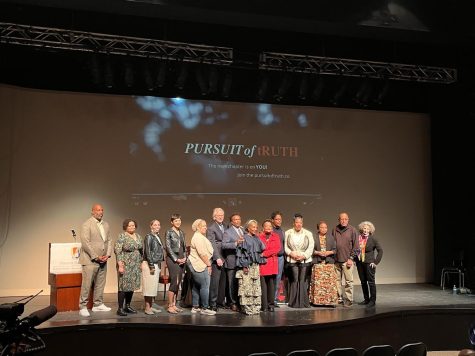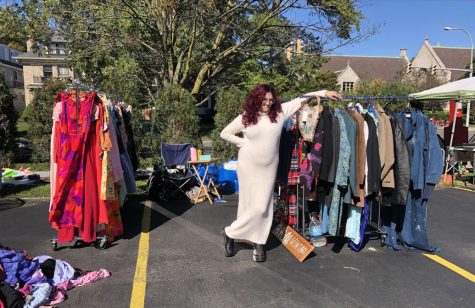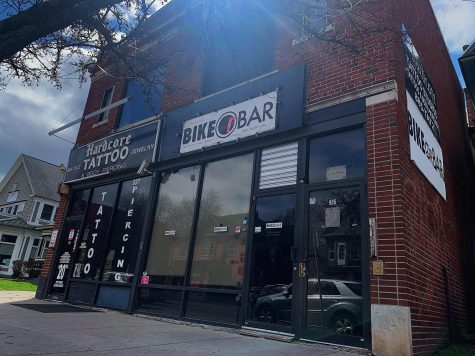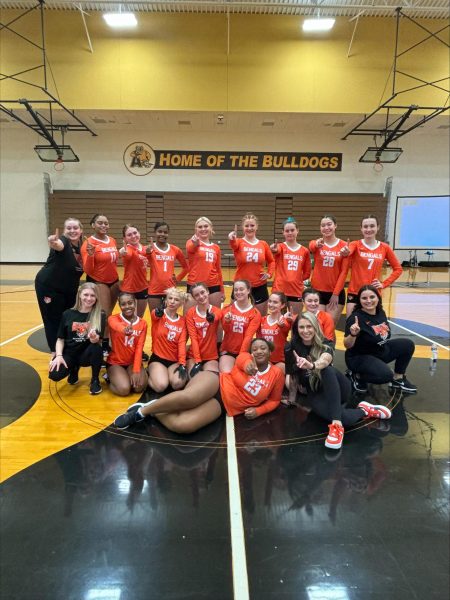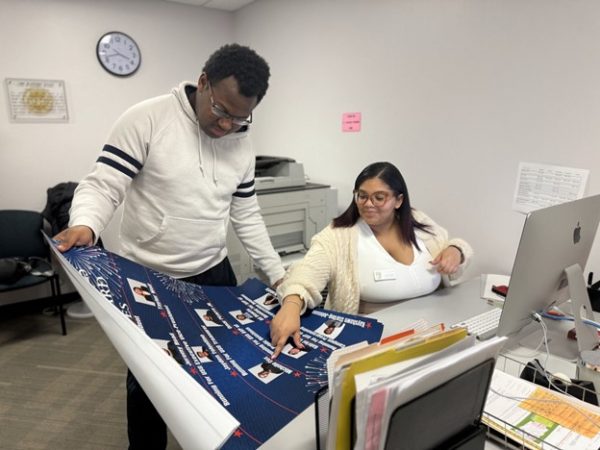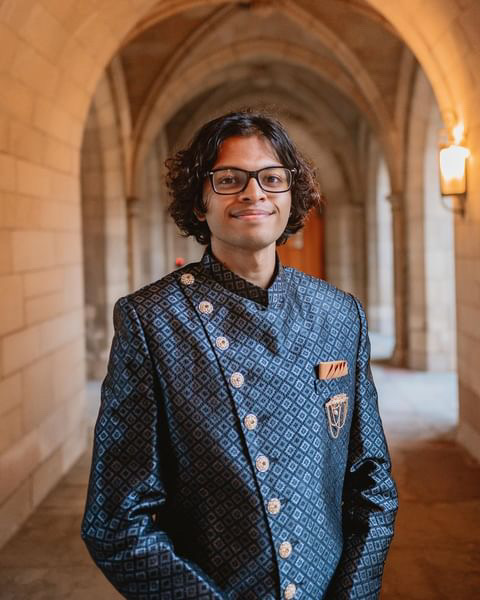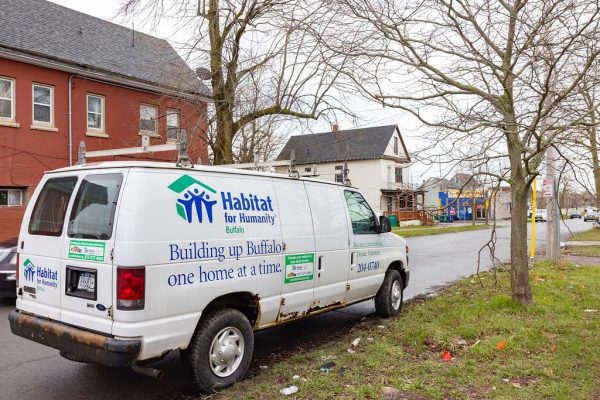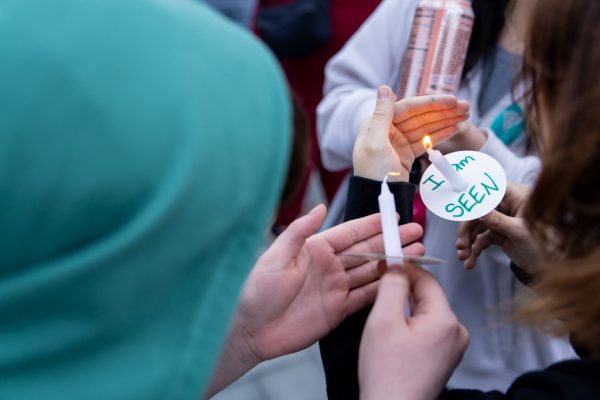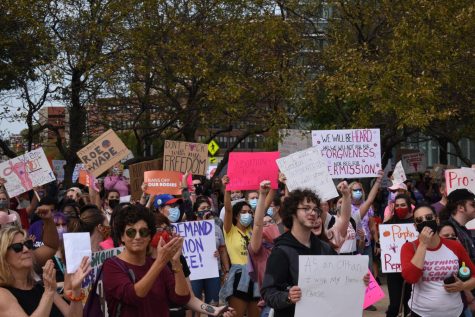Stitch Buffalo is helping refugee women earn more than just money
Stitch Buffalo founder Dawn Hoeg helps a “stitcher” with her project.
A community of refugee women on Buffalo’s West Side is being brought together by a shared love of beautiful things and by one ambitious design professor.
Stitch Buffalo gives refugee women an opportunity to make money, socialize in a safe environment and create something beautiful. The nonprofit organization comes up with embroidery, beading and weaving designs, then gathers supplies and gives refugee women a chance to create something from it.
The women learn stitching skills from weekly workshops and take their work home to complete it. Stitch Buffalo sells the completed product in shops around Buffalo, and soon, in their own Niagara Street storefront. Each piece has the name of the woman who made it on the tag, and the women get 70% of the total sales. The other 30% goes back into funding Stitch Buffalo and supplies.
Stitch also gets many secondhand clothing donations, and the women stitch intricate designs onto them and resell them at local shops including Second Chic, a local consignment shop.
The mastermind behind Stich Buffalo is Dawn Hoeg. Hoeg is a lecturer at SUNY Buffalo State in the design and fine arts department.
“What Stitch Buffalo does is gives women who fall through the cracks an opportunity to develop community, to develop skill, to develop a whole life,” Hoeg said. “They just learn how to be here in America, and it’s non-threatening, it’s fun, its creative, it’s easy. It’s a very comfortable transition point for women.”
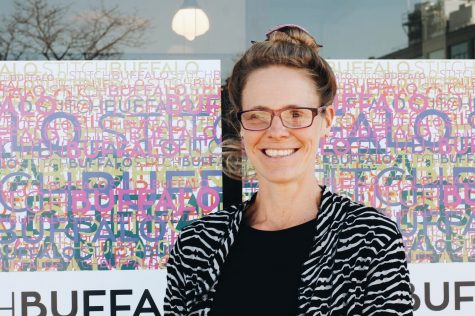
Dawn Hoeg poses in front of their new “all-in-one” workshop and storefront location at 1215 Niagara
Street.
She created Stitch back in 2014 after gaining inspiration during her commute to work.
“As the years passed, I started to notice the change in the neighborhood, mostly with the women standing at the bus stops and standing on the sidewalks on the West Side,” Hoeg said. “They were beautifully dressed; I loved what they were wearing.”
She figured these women must know some of the things she knew about working with textiles and wanted to reach out to them in some way and hone in on their talent. Hoeg decided to begin an embroidery and beading class, as it is the most portable and least expensive. She reached out to all three of the resettlement agencies on the West Side and spread the word about her first class.
“And nobody came,” Hoeg said, laughing.
Hoeg visited community events and invited some refugee women personally. Some of them showed up to her next class, and from then on, word spread.
“We steadily grew; more and more women were coming,” Hoeg said. “They were developing skills that were quite beautiful and artistic.”
Stitch has an open-door policy, meaning any refugee can come and go. The stitching community includes over 60 women from Bhutan, Burma, Nepal and Angola.
Hoeg’s immense passion for Stitch is evident. At first, Stitch was being funded out of her own pocket and the pocket of her former partner, Shelby Deck. Hoeg works a full-time job and most of her free time is devoted to Stitch. While she describes it as a “rollercoaster ride,” she wouldn’t trade it for anything.
“I help about 60 women on the West Side buy their own winter boots,” Hoeg said, tearing up. “There was a women that came in… and she was so happy, she bought her own winter boots from the money she made, and I was just floored by that because I was able to provide that opportunity for her.”
For many Stitch Buffalo women – Hoeg estimates over half – this is the first time they have been able to make money for themselves. Refugees have a hard time finding jobs. One of the main reasons is the language barrier. Many of these women speak little to no English, but conveniently, stitching is a visual art. Language is not as much of an issue because Hoeg and her volunteers work with them to overcome the barrier and the women help each other.
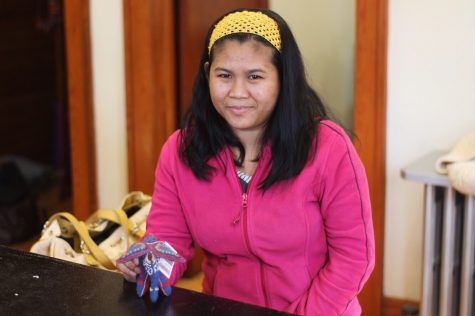
WahSay Paw, a refugee who’s been with Stitch for a while, says she comes to stitch to spend time with friends. She has seven children and four grandchildren and says that she uses the money she makes to buy medicine.
During last Thursday’s workshop at their new Niagara Street location, the women sat around the table smiling, laughing and stitching. For many of them, this is an escape, a chance to get out of the house and do something for themselves.
Eizar Lin is a refugee from Burma who has been with Stitch for about four months. She speaks the best English of all the women around the table and was humbly showing off a mini embroidered elephant she made. Lin says she “tries” and has learned a lot through YouTube. She has three small children, and her main reason for coming to America was so her children could have an education.
Hoeg runs the whole operation mostly herself, but she has a few volunteers. Maureen Chapman and Donna Ball, both passionate craftswomen, were helping women during the workshop.
Chapman has been volunteering for about a year. She used to knit with the former director of Stitch and was inspired to come in and see what Stitch was all about. She “instantly fell in love.”
“All of the women are so lovely to be around and so talented,” Chapman said. “One of these days I’m going to sit down and these women are going to teach me how to embroider! That’s my secondary motivation for coming.”
Ball describes herself as a “newbie,” since she’s been with Stitch for a month and a half. Her motivation? She’s been a “stitcher” her whole life and wanted to give back to the community, but the best part for her is the recycling of materials. She proudly showed off projects they make with the leftover scraps, claiming they “don’t waste anything.”
“It’s actually been better than I expected. It’s really such a sense of community,” Ball said. “Language is a problem, but stitching – I hate to say it’s a universal language, because that sounds so trite, but it is.”
Stitch has big plans brewing for the future. They just moved out of their old space at the Concerned Ecumenical Ministry into their new location at 1510 Niagara Street, donated to them by Rich Products. The new space is bright and homey, with many window-lined rooms for working and storing supplies. The back room features a large square table with benches so the women can all stitch in the same place.
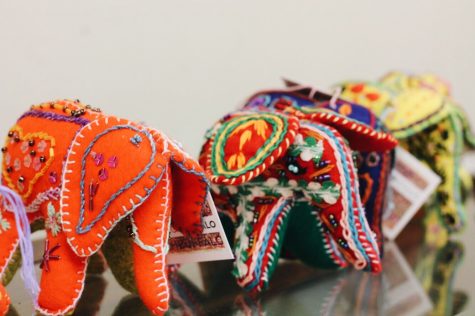
A few finished Stitch Buffalo creations ready to be sold.
The front of the space will be their new retail store. They have many projects in circulation now: Buffalove heart pins, mini embroidered elephants, a new peace pin and other embroidered accessories. The store will also double as a consignment shop, where they will sell donated used clothing and extra craft supplies. Stitch Buffalo hopes to open their storefront to the public on Small Business Saturday, which is Nov. 25.
Hoeg also has plans to start a teenager program open to teens in Buffalo interested in learning skills like embroidery and weaving. This program will be a “feeder” for the SUNY Buffalo State fashion and textile department.
“The whole thing is beyond what I ever thought it would be,” Hoeg said.
Her passion has grown Stitch Buffalo from scratch – and from what it looks like, will grow it into much more.
Email: [email protected]
Twitter: @chessabond
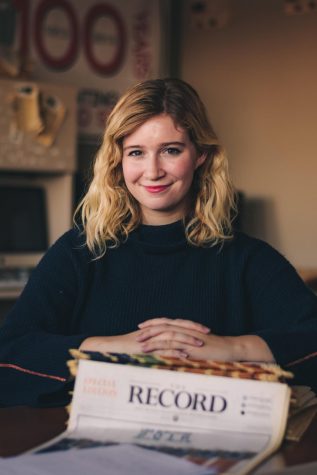
Francesca Bond is an undergraduate student at SUNY Buffalo State. She has a major in Journalism and a double minor in Sociology and Political Science....


